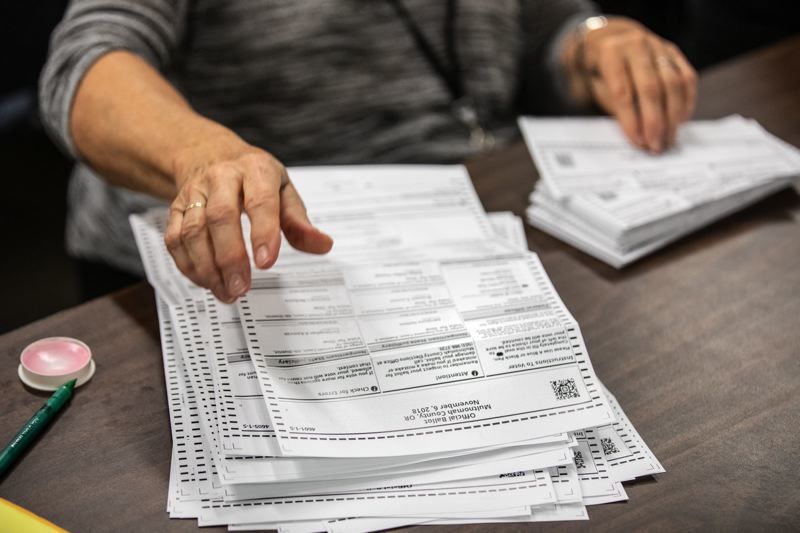Oregon election officials ask justice department to investigate three noncitizen voters
Published 5:25 pm Monday, February 17, 2025

- PAMPLIN MEDIA GROUP FILE PHOTO - Oregon's vote-by-mail ballots are opened and scanned at local elections offices.
Three people who were mistakenly registered to vote at Oregon’s Motor Vehicle Services Division could face a criminal investigation for voting despite not being U.S. citizens.
A spokesperson for the Secretary of State’s Office confirmed that the office sent names of three individuals suspected of voting despite not being U.S. citizens to the state Department of Justice for further review. A Department of Justice spokeswoman confirmed the office received a letter and said the department hasn’t yet determined whether it needs to investigate.
The development, first reported by OPB, follows months of internal investigations from the Secretary of State’s Office and the Oregon Department of Transportation about errors that resulted in more than 1,600 people erroneously being registered to vote. Officials are still figuring how many of those people ever voted and whether it was legal for those people to vote when they did.
Trending
Oregon began in January 2016 automatically registering citizens to vote when they obtain or renew driver’s licenses, permits or nonoperating IDs. A 2019 state law, meanwhile, eliminated a requirement that applicants prove they’re citizens or legal residents when obtaining a driver’s license.
Getting a license requires proof of identity — a birth certificate, passport, naturalization documents or visa — and proof of an Oregon address, such as a utility bill or rental agreement. Only people whose identity documents that prove citizenship, like a U.S. birth certificate, U.S. passport or certificate of naturalization, are supposed to be registered to vote.
But last September, a call from the Chicago-based nonprofit Institute for Responsive Government prompted DMV officials to take a closer look at how they were handling automatic voter registration. They found that some foreign passports and birth certificates were mistakenly marked as U.S. passports and birth certificates, meaning that people who didn’t prove citizenship were being registered to vote automatically.
And they later learned that about 300 people from the U.S. territories of American Samoa and Swains Island were wrongly registered to vote. Those territorial residents have U.S. passports and are allowed to vote in party presidential nominating elections, but they’re not U.S. citizens and can’t vote in other elections.
Since then, the DMV changed the layout of the software front-desk workers use in order to make it harder to accidentally enter the wrong type of identification and added prompts to ensure workers double-check documents. The DMV also reviews its records and publishes a monthly report, and since November it has found no new mistaken registrations.
Tess Seger, communications director for the Secretary of State’s Office, said elections officials are making every effort to reach the people they’re investigating as well as confirming data with county elections offices.
Trending
“These investigations began at an incredibly high-volume moment for the Elections Division,” she said. “It was right before a major election. It continued during a leadership transition. And we’re also giving the counties and the individuals who were impacted by this error from the state as much opportunity as possible to participate in an investigation.”
Some people who were wrongly registered to vote and voted were in fact citizens, state election officials learned when they began looking into the problem last year. And any who aren’t citizens could still be in the country legally.
It’s a crime for noncitizens to register to vote or cast a ballot in federal and state elections, though some jurisdictions allow noncitizens to vote in local elections. Voting as a noncitizen can result in prison sentences, fines and deportation.
Oregon automatically mails ballots to all registered voters. During a legislative hearing last fall, Democratic members of the House Rules Committee expressed sympathy for people who may have been registered to vote and then broke the law by voting without knowing better.
“They didn’t ask to be registered to vote, but they were by their government,” House Majority Leader Ben Bowman, D-Tigard, said at that hearing. “Their government sent them ballots, we all talked about the importance of voting, and then they voted.”
Gov. Tina Kotek ordered a pause to the state’s motor voter law until an outside contractor, the Baker Tilly Advisory Group, completes an audit. It’s expected to release a final report at the end of April.
Legislative Republicans, meanwhile, are pushing for a permanent end to the motor voter law. House Minority Leader Christine Drazan, R-Canby, introduced House Bill 3473 to block the DMV from automatically sending information to election officials and instead require Oregonians to proactively fill out a voter registration card.
Drazan also signed on to House Bill 2442, to require Oregonians to prove citizenship before they register to vote. Federal law only requires voters to attest to being citizens, with the warning that they could face federal criminal charges if they aren’t.
Only one state, Arizona, now requires proof of citizenship to register to vote. Because Arizona law is more restrictive than federal law, it has a bifurcated voter registration system that results in voters who provided documents proving citizenship receiving ballots with all races and those who didn’t prove citizenship only being allowed to vote for federal races.
Neither bill has been scheduled for a hearing.





